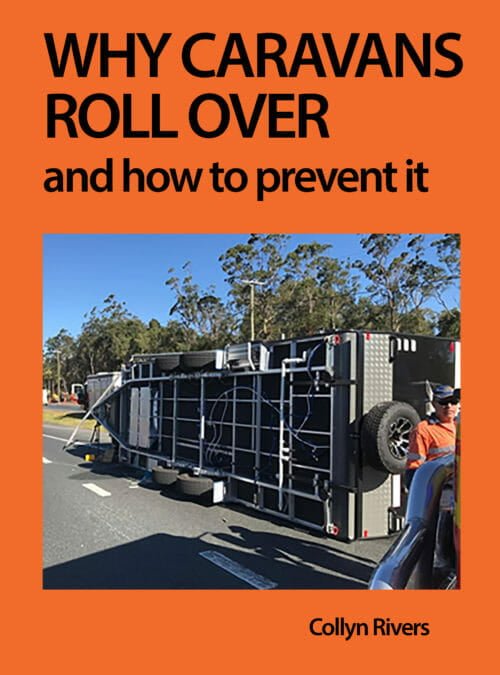by Collyn Rivers
Safe Caravan Towing
Here are 10 tips for safe towing: caravans and their tow vehicles have much the same accident rates as other forms of motor transport, their main type of accident, jack-knifing, however, is different.
Tip One for safe towing: limit speed
Never tow above 100 km/h (especially if overtaking). Driving too fast is by far the major cause of caravan-related accidents.
Tip Two: do not exceed maximum legal weight
Never load a tow vehicle or trailer above the maximum weight limits stipulated by the manufacturers. Doing so is illegal, dangerous and will invalidate your insurance. Knowing the weight of your tow vehicle and trailer is as important as carrying your passport overseas.

Overtake whilst towing with great care. Pic: AL-KO
Tip Three: correct weight ratio
Ideally, a laden trailer’s weight should exceed a laden tow vehicle’s weight (ideally only 80%). If you follow this recommendation, in RV Book’s opinion, you will have no need for a Weight Distributing Hitch. The use of such a hitch is advisable if the caravan‘s laden weight exceeds the tow vehicle’s laden weight, but that vehicle’s ‘cornering power’ is then inherently reduced.
Tip Four: adequate tow ball mass
It is essential to have your trailer’s front end heavier than its rear. For camper trailers, not less than 5% of the trailer’s laden weight should be on the tow ball. For Australian caravans the percentage should be 8% to 10% (the longer and heavier the caravan, the higher the percentage needed). UK/EU-made caravans are by and large much lighter – they need 6% – 7%. This mass must remain reasonably constant. It should not vary as water tank content varies.
Towing stability is since proven to relate to tow ball mass. The lower the trailer’s percentage of its weight on the tow ball, the lower the stability. Furthermore, the lower that tow ball mass, the lower the so-called critical speed. The critical speed is that above which a strongly snaking caravan cannot be driver corrected.
Any heavy trailer longer than about 5 metres with less than 7% tow ball mass is (in RV Books’ opinion) an accident waiting an opportunity to happen. Its critical speed may be as low as 50-70 km/h. Find out more about critical speed here
Tip Five: Correct weight distribution
- Heavy items in a trailer should be stowed low down and close to the axle(s).
- Store only store lighter items higher up and away from the axle(s).
- Never store heavy items at the front or rear of the trailer.
Tip Six: limiting height
Keep everything as low as feasible across your entire rig consistent with adequate ground clearance. The lowest part of a rig is usually the tow vehicle’s differential housing/s or exhaust.
Tip Seven: tow vehicle choice
Choose a tow vehicle that has:
- A maximum towing capacity greater than the laden weight of your trailer
- An adequate maximum tow ball allowance for your trailer
- Has the longest possible wheelbase (i.e. distance between its front and rear axle/s)
- Has the shortest possible distance from rear axle to tow ball
- Find out more about choosing the right tow vehicle here.
Tip Eight: trailer choice
Choose a trailer that:
- Is as light as possible
- Is as short as possible
- Has the longest possible distance between the tow ball and its centre of mass. Extended A-frames help, but at the expense of increased turning circles.
Tip Nine: tyres
Use ‘Light Truck’ tyres to assist trailer and tow vehicle handling. Their stiffer sidewalls enable them to carry their maximum weight at all times, and they are better able to resist yaw and snaking. They are a little noisier and have a slightly harder ride compared to normal tyres, but safety is more important.
Never increase the tow vehicle’s front tyre pressure for towing. Always increase the tow vehicle’s rear tyre pressure by 50-70 kPa (7-10 psi) whilst towing. In borderline cases simply using these pressures eliminates the need for a WDH.
Tip Ten: Why Caravans Roll Over – and how to prevent it
Our book –Why Caravans Roll Over – and how to prevent – it explains just how and why caravans roll over. It has many pages that advise how you can reduce the risk.
An invaluable feature is a Question & Answer section that enables you to assess your own rig’s likely stability. It shows how to remedy the failings.


